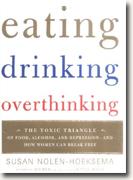Eating, Drinking, Overthinking
Susan Nolen-Hoeksema
book reviews:
· general fiction
· chick lit/romance
· sci-fi/fantasy
· graphic novels
· nonfiction
· audio books
· author interviews
· children's books @
curledupkids.com
· DVD reviews @
curledupdvd.com
newsletter
win books
buy online
links
home
for authors
& publishers
for reviewers

 |
Eating, Drinking, Overthinking: The Toxic Triangle of Food, Alcohol, and Depression--and How Women Can Break Free Susan Nolen-Hoeksema Henry Holt Hardcover 272 pages December 2005 |
|
As is true of many books of this sort, Susan Nolen-Hoeksema’s book, Eating, Drinking, Overthinking, about American women’s psychology, is slightly better at describing the problem than at presenting the solution. However, as this reader did not know of this “toxic triangle” until reading the text, the book is useful to discover a condition and theory that make great sense. It seems that many women have these “toxic” habits: “As many as 80 percent of women who are drawn into one of these afflictions find themselves crossing the line into at least one of the others.”
Her new book falls somewhere between an academic/textbook style of writing – with many case studies as models – to a self-help book. To my mind, it falls into the second category most firmly. The author explains the reasons for women’s high rates of depression (“One in four women [in the United States], at some time in her life, will experience symptoms of depression severe enough for a diagnosis of major depression, one of the most severe forms of depression.”)– peer and advertising pressure to look and act certain ways, taking on too much, caring too much for others and not enough for yourself . She also talks about genetic depression, about chemical imbalances – serotonin and dopamine -- and about hormones. But she pays little attention to another kind of situational depression, which, to my mind, is one of the reasons an increasing number of Americans (of both sexes) are depressed. A college instructor, I see more and more young students falling prey to depression and/or suicidal thoughts, and I believe there is a connection to the political and economic situation of our country at this point in time. There is less cause for hope for this new generation than there has been in many years. But back to the book at hand. As treatments, the author’s suggestions of practicing mindfulness or meditation may work well for many women. Two other effective solutions to this toxic triangle seem to be a) to keep a diary, intentionally investigating events, their triggers and your reactions, and b) doing volunteer work instead of sitting around on the couch overeating or drinking one more glass of wine: “Helping other people is a great mood lifter, as well as an important expression of what you believe… Your personal concerns will be cast in a different light after you’ve spent some time with the less fortunate.” The author also recommends closely investigating your feelings about your line of work, the way you’re treated, whether or not you are doing what your heart wants you to do. Switching jobs or investigating taking a class may be options that many women have not seriously considered. When offering solutions to help women “break free” from these conditions, the author is gentle. She does not advocate entirely changing your diet or giving up alcohol, just taking a more sensible, healthy approach to what you ingest. She recommends more exercise and spending time volunteering instead of sitting around stewing. Not once does she say that therapy is essential, although she does suggest joining a women’s group. In fact, she doesn’t even recommend anti-depressants (“they don’t ‘cure’ depression.”). Her goal seems to be to enable women to find their own paths out of these unhealthy life habits, without drugs or alcohol if at all possible, replacing old actions with more productive and satisfying ones – and slowing down racing minds. Along with addressing her intended audience, adult women, Nolen-Hoeksema includes a most helpful section on helping young girls and women avoid falling into the toxic triangle. Several pages of resources related to her topic and also to writing and meditation are included. Nolen-Hoeksema’s previous book was Women who Think Too Much (2002). A professor of psychology at Yale University, the author has studied women’s mental health issues for twenty years. Originally published on Curled Up With A Good Book at www.curledup.com. © Deborah Straw, 2006 |
|
|
|
 Click here to learn more about this month's sponsor! |
|
| fiction · sf/f · comic books · nonfiction · audio newsletter · free book contest · buy books online review index · links · · authors & publishers reviewers |
|
| site by ELBO Computing Resources, Inc. | |
 The author defines “overthinking” this way: “…this process of going over and over a situation and the feelings it provokes, rehashing things that have happened before, worrying about the future, being unable to make decisions in the present...” In an article in Psychology Today, she said, “We are suffering from an epidemic of overthinking--caught in torrents of negative thoughts and emotions that overwhelm us and interfere with our functioning and well-being." Women apparently do this much more than men.
The author defines “overthinking” this way: “…this process of going over and over a situation and the feelings it provokes, rehashing things that have happened before, worrying about the future, being unable to make decisions in the present...” In an article in Psychology Today, she said, “We are suffering from an epidemic of overthinking--caught in torrents of negative thoughts and emotions that overwhelm us and interfere with our functioning and well-being." Women apparently do this much more than men.